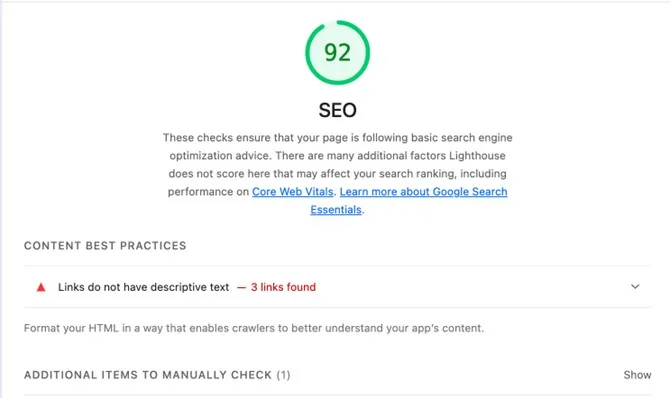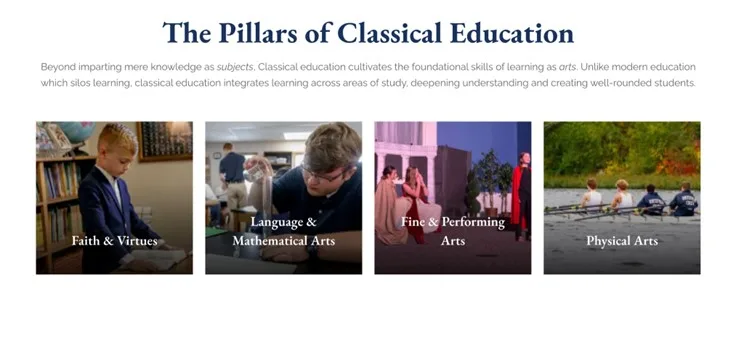Every company wants to stand out from the competition. SEO for schools is one way your education business can do just that.
An effective SEO strategy helps you get discovered on search engines by prospective parents or students. And when done right, you don’t just rank higher in generic searches—a targeted approach allows you to rank in search engine results pages for your ideal customer profile.
Contents
What is SEO for schools?
SEO, which stands for search engine optimization, is the implementation of tactics to help your website rank higher in relevant search engine queries.
SEO techniques include technical elements you incorporate in the backend of your website, plus on-page actions, like integrating keywords in your copy. The overarching goal is to help search engines understand the content of your website, so that they can surface relevant pages for searchers who are looking for services like yours.

Incorporating relevant keywords into your page titles and meta descriptions is one component of SEO.
While SEO has been around for decades, it’s evolving rapidly right now because of AI. More consumers are relying on Google AI Overviews at the top of SERPs, while others are turning to generative AI tools, like ChatGPT, to answer questions they may have otherwise plugged into a traditional search engine.
These behavioral shifts have led marketing pros to coin the term GEO, or generative engine optimization, which applies the principles of SEO to help brands rank in AI-driven search results.
While that means some shifts to traditional SEO, many of the approaches that have long generated SEO success can be implemented or modified to work for GEO, too.
💡 Ready to start improving your school’s SEO strategy? Get a head start with our free, quick guide to local SEO!
Why SEO for schools matters
The number of educational services businesses has grown an average of 2.2% per year from 2019 to 2024. That means more competition in the space—if you’re trying to attract new students, you’ve got to create an effective marketing strategy that helps you stand out.
SEO is how you get discovered, whether on a search engine’s results page, in Google Maps results, or (increasingly) within the response from a generative AI tool.
Because the search landscape is always changing, your SEO strategy should adjust, too. While some tried-and-true tactics remain as effective as ever, some are shifting to reflect the current search landscape and consumer search habits.
SEO for schools: 6 tips to rank higher and be Google’s star pupil
Read on to learn how smart tweaks to your SEO for schools can help you rank higher in the modern search environment.
1. Get your technical SEO in order
Before you think about anything happening on the pages of your website, look behind the scenes. The infrastructure of your education website can have a big impact on how your pages appear in search results.

Google Lighthouse will grade your site’s SEO and provide suggestions for improvement.
Technical SEO encompasses a variety of infrastructure and coding elements, including:
- Site architecture: Are the pages on your website organized and linked logically with a clear hierarchy and structure?
- User experience (UX): Does your site have fast load times, and is it created with a responsive design? (E.g., Does it look good on desktop and mobile?)
- Structured data/schema markup: Does your website present information in a standard format that makes it easy for search engines to crawl and index the content?
- Website security: Does your site have a valid SSL certificate, which means it’s encrypted and secure? (You can check this by looking for “HTTPS” at the start of your site’s URL.)
To understand where your technical SEO stands today and how you can improve, it helps to run an audit of your current site. A tool like our free SEO website grader can help! Or if you’re looking for a developer-friendly output, Google Lighthouse can run more technical performance audits on your site.
🚨 Are these common website mistakes hurting your school’s SEO strategy? Download our free guide to find out!
2. Revisit your keyword strategy
If you already have a website, chances are you’ve done keyword research before. Keywords are the words or phrases you incorporate into your on-page text and within technical elements like meta descriptions to help your page rank for those terms.
When you run a business that serves a specific geography (like a K-12 school or preschool), you’ll want to focus on local keywords to appear in searches for your area.

This school incorporates location-specific keywords into its homepage copy.
As you consider your keyword strategy, start with research. What search terms does your site rank for now, and is there an opportunity to improve upon its performance there?
Alternatively, you can look at direct competitors to see what they’re ranking for and try to make inroads on the words and phrases where they’re shaky.
You also want to consider a mix of short, broad keywords (e.g., “private school NYC”) and more specific long-tail keywords (e.g., “performing arts high school NYC”). You should also tailor the keywords for the content on each specific page, with keywords that encompass your entire business on your homepage and narrower keywords suited to each sub-page.
3. Build up your backlinks
A backlink is a hyperlink on an outside website that drives back to your site. Building up a volume of backlinks on others’ websites helps boost your site’s authoritativeness, which is a key ranking factor in Google’s E-E-A-T framework (which stands for Experience, Expertise, Authoritativeness, and Trustworthiness).

A traditional backlink building strategy includes outreach to relevant sites, presenting them with a piece of your content you think their audience would find useful, and asking if they’d link to it on their blog.
As GEO continues to develop, early indicators are that seeking media mentions is beneficial for ranking in AI. Having your business mentioned or leadership quoted in a reputable publication can help your name appear in AI results.
And backlinks don’t need to come only from traditional media. If someone from your leadership team appears on an industry podcast or answers questions on a collaborator’s blog in an AMA (or “Ask Me Anything”), those are other ways to garner backlinks for your site.
4. Build a robust content program
Your content program has an outsized role to play in SEO for schools. Building out a content strategy that incorporates SEO and regularly producing content that appeals to your audience can establish your school as an expert in your space and drive your website up the search results rankings.

This private classical Christian school provides in-depth information about why it is committed to a classical education and what that means in practice for students.
As you publish more high-value content, you create additional opportunities for individual web pages to rank highly in search. A single website sub-page can drive thousands of new people to your site if it ranks well for relevant keywords.
But your content program isn’t just what you publish on your website. In fact, with the rise of GEO, short-form content and information you put out on social media can help you rank in AI results. This content doesn’t need to be written, either. Video content can rank on YouTube or help you appear in generative AI tools.
What matters more than format is quality. Aim to create content your audience wants but can’t find anywhere else. Showcase your expertise, and share stats and data that matter to your target demographic. Putting out high-quality content over time is essential for strengthening your business’s standing online.
⚡ Google Ads can boost your organic SEO efforts, but how much would they cost your school? Find out using our free 2025 early education digital advertising benchmarks report!
5. Make your content zero-click friendly
Today, fewer consumers are going to a website for answers. Between Google’s AI Overview and responses in generative AI tools, zero-click searches are having a moment.
But this isn’t a new phenomenon. Google’s featured snippets have been around for years, and they presented the same challenge for SEO pros: Searchers remained on Google’s results pages, rather than navigating to a business’s website.

Optimizing your content to appear in these zero-click results can get your site featured right at the top of SERPs. There are a few on-page tactics that may make a search engine or AI tool more likely to surface your content in its results:
- Answer questions on the page. Format your content as an FAQ or Q&A so search engines and generative AI tools recognize your site as having the answer to a query they’re fielding.
- Keep it brief. Shorter answers (around 50 words) are bite-sized enough to be pulled into Google’s AI Overview.
- Use proper HTML formatting. H-tags and body copy create order on the page and make it easier for search engines to understand what your content is saying.
- Answer questions real searchers are asking. Check the “People also ask” section in Google search results for terms you can target.
These steps contribute to effective SEO for schools, whether you’re aiming to appear in zero-click results or hope to drive readers to your website.
6. Gather reviews from parents and/or students
Online reviews can have a real impact on your rankings in search engines. Think about the last time you looked for a local service provider on Google—chances are, those top results were either sponsored or highly ranked.

You’ll notice a common thread among these preschools that appear at the top of Maps results: They’re all highly rated.
If your school is short on reviews now, never fear! It’s easy to create a system to gather third-party reviews that can enhance your ranking.
Start by asking current and former students or their parents—depending on the ages of those you serve—if they’re willing to leave a review. Just be sure the review platform allows you to do so. For example, Google is okay with businesses soliciting feedback, whereas Yelp is not.
Then, implement a few simple systems that make it easy to gather reviews going forward. Create an off-boarding email series for families who are wrapping up their time with you, and include a link for them to leave you a review.
As reviews roll in, be sure to respond to each one and thank the writer for their feedback. This goes a long way toward making a positive impression on anyone who reads the review!
Go for the A+: SEO for schools to rank higher
To improve your SEO, start with some self-reflection. What grade would you give your current SEO practices? And how can you boost that grade in the coming months and years?
Just as with a student report card, it’s a good idea to assess your SEO progress regularly. Consumer search habits and shifts in the algorithms may mean that an effective strategy today will need adjustments in the future. Check in on your work at least twice a year and stay on top of the latest industry trends.
Smart, regular adjustments to your SEO strategy are key to improving your ranking and earning your spot at the top of the class. For more ways to kickstart your school’s SEO strategy, see how our solutions can help!







